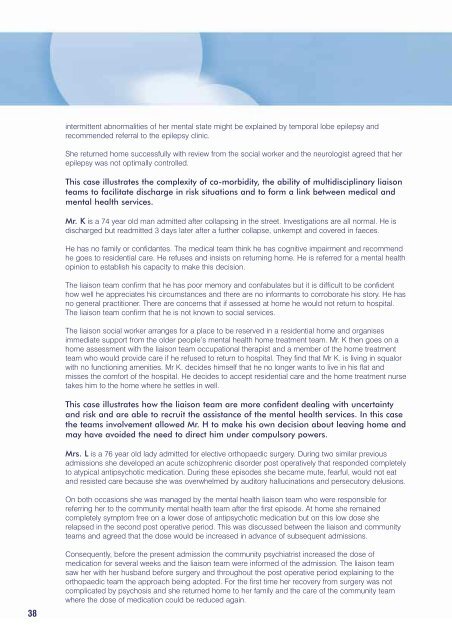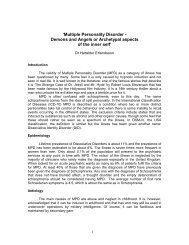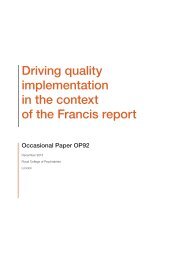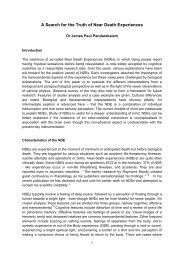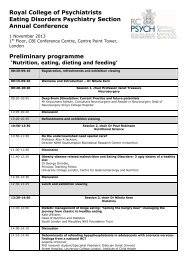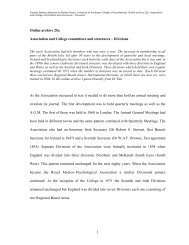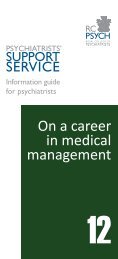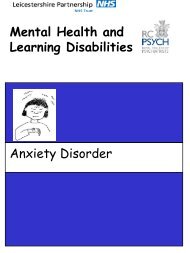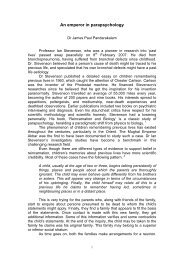Who Cares Wins - Royal College of Psychiatrists
Who Cares Wins - Royal College of Psychiatrists
Who Cares Wins - Royal College of Psychiatrists
You also want an ePaper? Increase the reach of your titles
YUMPU automatically turns print PDFs into web optimized ePapers that Google loves.
38<br />
intermittent abnormalities <strong>of</strong> her mental state might be explained by temporal lobe epilepsy and<br />
recommended referral to the epilepsy clinic.<br />
She returned home successfully with review from the social worker and the neurologist agreed that her<br />
epilepsy was not optimally controlled.<br />
This case illustrates the complexity <strong>of</strong> co-morbidity, the ability <strong>of</strong> multidisciplinary liaison<br />
teams to facilitate discharge in risk situations and to form a link between medical and<br />
mental health services.<br />
Mr. K is a 74 year old man admitted after collapsing in the street. Investigations are all normal. He is<br />
discharged but readmitted 3 days later after a further collapse, unkempt and covered in faeces.<br />
He has no family or confidantes. The medical team think he has cognitive impairment and recommend<br />
he goes to residential care. He refuses and insists on returning home. He is referred for a mental health<br />
opinion to establish his capacity to make this decision.<br />
The liaison team confirm that he has poor memory and confabulates but it is difficult to be confident<br />
how well he appreciates his circumstances and there are no informants to corroborate his story. He has<br />
no general practitioner. There are concerns that if assessed at home he would not return to hospital.<br />
The liaison team confirm that he is not known to social services.<br />
The liaison social worker arranges for a place to be reserved in a residential home and organises<br />
immediate support from the older people’s mental health home treatment team. Mr. K then goes on a<br />
home assessment with the liaison team occupational therapist and a member <strong>of</strong> the home treatment<br />
team who would provide care if he refused to return to hospital. They find that Mr K. is living in squalor<br />
with no functioning amenities. Mr K. decides himself that he no longer wants to live in his flat and<br />
misses the comfort <strong>of</strong> the hospital. He decides to accept residential care and the home treatment nurse<br />
takes him to the home where he settles in well.<br />
This case illustrates how the liaison team are more confident dealing with uncertainty<br />
and risk and are able to recruit the assistance <strong>of</strong> the mental health services. In this case<br />
the teams involvement allowed Mr. H to make his own decision about leaving home and<br />
may have avoided the need to direct him under compulsory powers.<br />
Mrs. L is a 76 year old lady admitted for elective orthopaedic surgery. During two similar previous<br />
admissions she developed an acute schizophrenic disorder post operatively that responded completely<br />
to atypical antipsychotic medication. During these episodes she became mute, fearful, would not eat<br />
and resisted care because she was overwhelmed by auditory hallucinations and persecutory delusions.<br />
On both occasions she was managed by the mental health liaison team who were responsible for<br />
referring her to the community mental health team after the first episode. At home she remained<br />
completely symptom free on a lower dose <strong>of</strong> antipsychotic medication but on this low dose she<br />
relapsed in the second post operative period. This was discussed between the liaison and community<br />
teams and agreed that the dose would be increased in advance <strong>of</strong> subsequent admissions.<br />
Consequently, before the present admission the community psychiatrist increased the dose <strong>of</strong><br />
medication for several weeks and the liaison team were informed <strong>of</strong> the admission. The liaison team<br />
saw her with her husband before surgery and throughout the post operative period explaining to the<br />
orthopaedic team the approach being adopted. For the first time her recovery from surgery was not<br />
complicated by psychosis and she returned home to her family and the care <strong>of</strong> the community team<br />
where the dose <strong>of</strong> medication could be reduced again.


